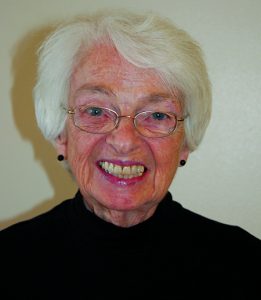Maureen McCormack Offers Her Perspective on Interfaith Dialogue
Posted on March 1, 2017, by Loretto Community
By Maureen McCormack
As I think about the topic of interfaith dialogue, I realize that most of us grew up in one faith or no faith tradition. Some were part of an interfaith household. Many families protected children from influences of other religious traditions. Stereotypes about different faiths were rampant, including plenty of stereotypes about us.Of course, neighborhood children vied with one another about which religion was the best. My mother used to tell us we didn’t need to argue about which was the best; we belonged to the one true church. As an adult, I imagined that most people believed that their religion, or non-religion, was the best; otherwise, they probably would have switched to something else.
Now, many years later, I know that I have been enriched by multiple connections with many faith traditions. My major professor for graduate work at a Methodist-related university was Jewish. I treasured sharing Seder meals with Jewish families. I had the privilege of making a retreat with Thich Nhat Hanh, a Vietnamese Buddhist monk. There I learned about engaged Buddhism with its social action agenda. As Thich Nhat Hanh introduced us to walking meditation, he said: “Walk as though lotus blossoms spring beneath your feet.” I had never seen a lotus blossom before, but I gravitated to the idea of it immediately. From the Muslim tradition, I am drawn to the 99 beautiful names of God. One of my favorites is “The Equitable One — the One who does everything with proper balance and harmony.” My Muslim friends would invite me to Ramadan dinners in their homes.
My friends at the Multicultural Mosaic Foundation, a group of moderate Muslims, introduced me to the teachings of M. Fethullah Gulen, a prominent Turkish religious scholar, who has inspired a whole movement of Sufi-oriented Muslims who do not believe in having enemies, who are respectful of all religious traditions and people of no faith tradition, and who establish islands of peace everywhere.
One of the projects of the Gulen followers is a music program featuring the three Abrahamic faiths. The call to prayer includes rich symbolism from these traditions — a Jewish shofar, Christian church bells and the Muslim call to prayer — followed by religious texts from the three faiths.
I was part of a trip to Turkey sponsored by the Multicultural Mosaic Foundation. One day we walked through the Garden of Tolerance in Belek, where hotel owners had built a synagogue, a church and a mosque for their guests around a center courtyard. In the courtyard is a fountain with three peacocks drinking from the same fountain.
All of us have a piece of the truth, the holy. We need to share the spark of the divine with one another.
Gulen speaks of “the heart’s spiritual liveliness” and of being so tolerant that people’s hearts “become wide like the ocean.” I love the phrase. It resonates with my spirit.
So, what sets us on fire inside and moves us to action? How does “the heart’s spiritual liveliness” enable us to reach out to the whole world creating islands of peace everywhere?
I am drawn into a deeper realm by these lines from the Gospel of Luke: “In the tender compassion of our God, the dawn from on high shall break upon us to shine on those who dwell in darkness and the shadow of death and to guide our feet into the way of peace.” I need to dwell here — lured by the beauty and the power of these rich phrases.
Respect for creation is something we share across many traditions. Thomas Berry, author of The Dream of the Earth and The Great Work, speaks of creation as being our first Scriptures, before any sacred words were written down. The astonishing beauties of creation reveal the many faces of God to us.
We need to find the connecting links in all our diversity that create a road we can travel together. The Multicultural Mosaic Foundation speaks of “respecting other people’s sacred.” We can do that. They believe in “creating harmony through dialogue.” We can do that.
Religion need not be a source of division among us. Life is too short. Working for justice and acting for peace are too urgent. Through our diverse traditions and shared values, we will create a better future for everyone. We can do this.

